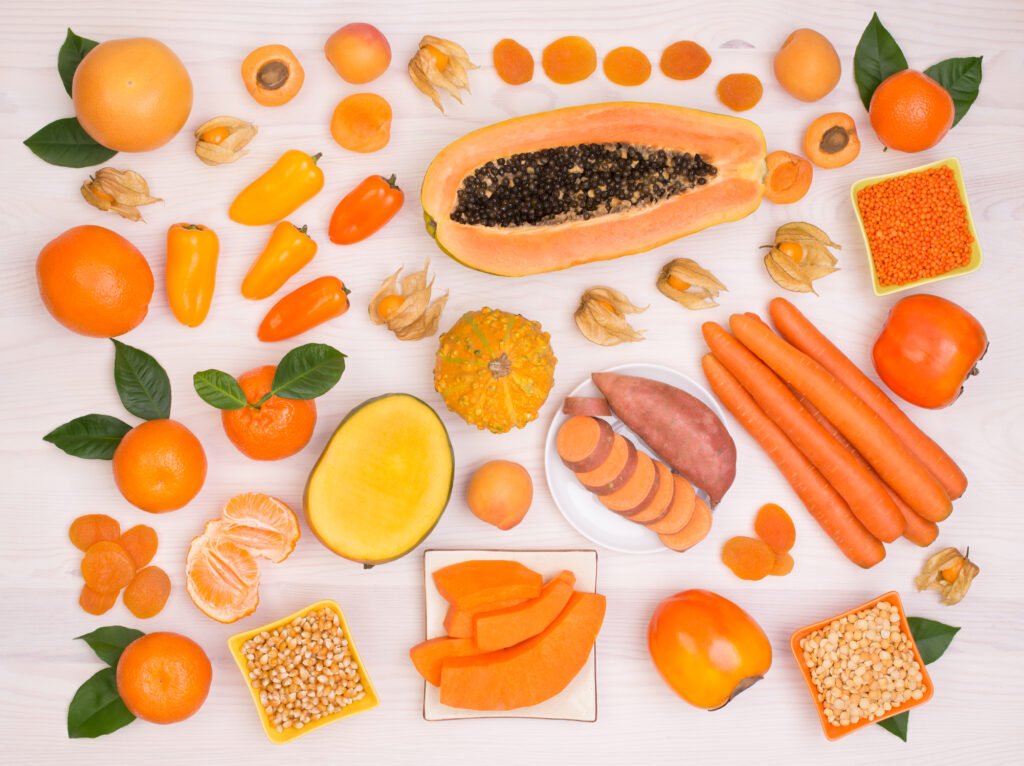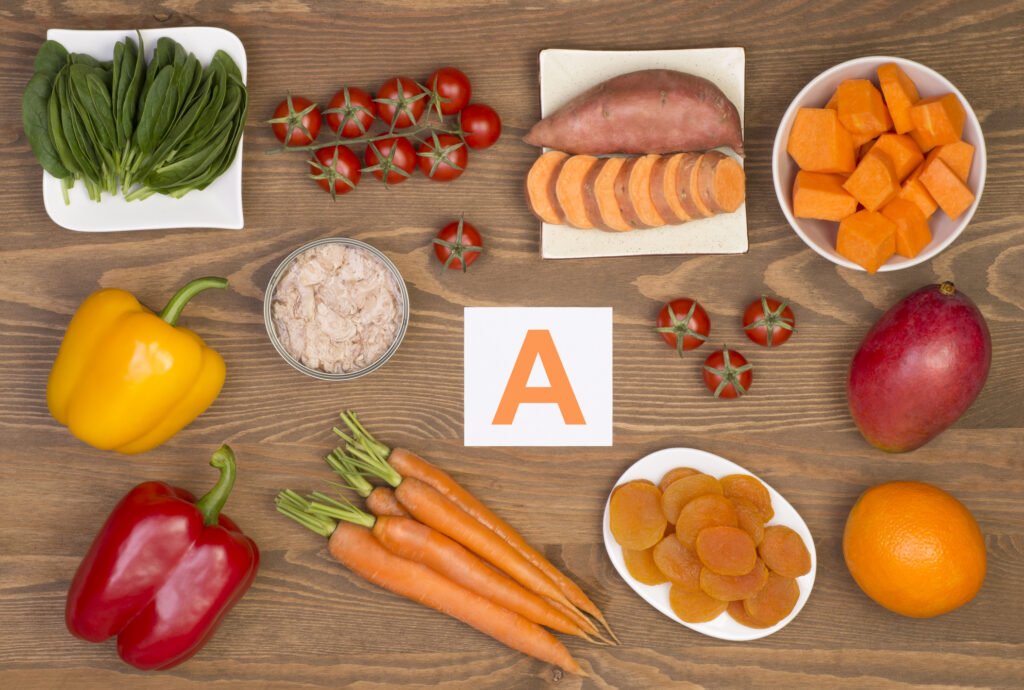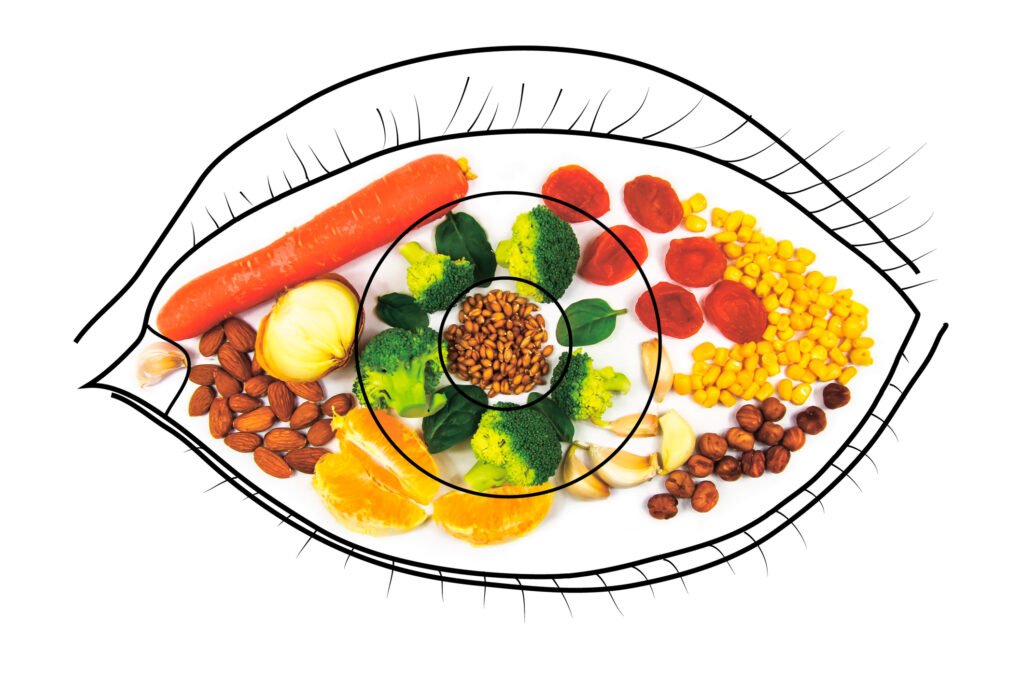Vegan Globetrotter is supported by our audience. When you purchase through one of our links, we may earn a small affiliate commission. As an Amazon Associate I earn from qualifying purchases. Your cost is not affected.
==================
Have you ever heard of veggies with beta-carotene? Or even vegetables high in beta-carotene? Do you ever look at fruits and vegetables and wonder why they have such pretty colors? They contain carotenoids. These carotenoids are natural pigments that help plants absorb and convert light energy.

One of these particular carotenoids is beta-carotene. It’s perfect for you! But what is it, and where can you get it? That’s what we’re going to explore. Before anything else, let’s discuss what beta-carotene is and why it’s important. So, let’s jump in!
Beta-Carotene
Hi there! Are you aware that beta-carotene handles the gorgeous orange-red color of some fruits and vegetables? It’s pretty sweet, right, and the name derives from the Latin word for a carrot! Your body converts beta-carotene into vitamin A from sweet potatoes, carrots, and dark leafy greens. It’s also in butternut squash, cantaloupe, lettuce, bell peppers, apricots, broccoli, and peas. That’s why people call beta-carotene the “provitamin A carotenoid.” So remember to include some of this vivid greens in your diet. Provide your body with the vitamin A it demands to remain healthy!

Also, it’s a unique kind of vitamin that melts in fat. What does that mean? It means that when you eat veggies with beta-carotene, your body can’t absorb it alone. But don’t worry; we’ve got a solution! Healthy fats like olive oil or almonds help your body absorb beta-carotene-rich veggies. Hence, add healthy fat to your beta-carotene-rich foods for the best absorption and benefits.
Benefits of Eating Vegetables High in Beta-Carotene

Eye Health

Taking veggies rich in beta-carotene can be good for your eyes! This mighty antioxidant can stop cancer cells from growing in your eyes and keep your eye cells healthy. Plus, it can lower your chances of getting macular degeneration, making you blind. So, add some beta-carotene-packed veggies to your diet to give your eyes some extra love and care!
Lower Risk of Cancer

Eating greens high in beta-carotene can also help protect you from cancer. Beta-carotene is an antioxidant that helps defend your cells from damage. Eating meals high in beta-carotene increases your body’s defensive chemical. Thus, this can help prevent cancerous cells from growing.
Skin Benefit
What if I tell you that veggies high in beta-carotene are great for your skin inside and out? Yes, you’ve heard that right! When you eat beta-carotene, your body transforms it into vitamin A for healthy, bright skin. Beta-carotene can give your skin a subtle glow, especially if you have olive or tan skin tones. Add some beta-carotene-packed veggies to your plate for healthy and glowing skin!
Brain Function

Brain Function
Finally, vegetables high in beta-carotene may also be good for your brain. High-beta-carotene veggies increase brain function and reduce Alzheimer’s disease symptoms, according to research. So, if you still want to keep your brain sharp, you should eat more foods high in beta-carotene. Many fruits and veggies contain beta-carotene, making them easy to consume enough.
List of Vegetables High in Beta-Carotene
High Beta-carotene content is essential to maintaining healthy skin, eyes, and immune function. Luckily, many delicious and nutritious greens are high in beta-carotene. Now, we’ll explore the best list of vegetables high in beta-carotene. So, let’s dive in and discover the benefits of these fantastic beta-carotene-rich veggies!
Broccoli

Brocolli
Did you know that broccoli is one of the cruciferous vegetables high in beta-carotene and loaded with nutrients? One cup of raw broccoli contains about 1,623 micrograms of beta carotene, more than double the recommended daily intake of 700 micrograms. Additionally, broccoli is an excellent source of vitamin C, vitamin K, and fiber.
Butternut Squash

Butternut Squash
The fact says that butternut squash is one of the veggies that’s jam-packed with beta-carotene. Yes, it’s true! Cooked butternut squash is an excellent source of vitamin A, providing a whopping 457% of the recommended daily intake in just one cup. Vitamin A maintains healthy skin, vision, and immunity, so this is great. Take advantage of this delicious and nutritious veggie this winter; add some butternut squash to your diet today!
Peas

Peas
Is it true that peas are also a fantastic source of beta-carotene? Yes, with just one cup of cooked peas, you can get over 1,120 micrograms of this incredible antioxidant – that’s way more than you need in a day! But that’s not all – peas are also packed with protein, fiber, and other vital nutrients your body needs to stay healthy. So next time you’re looking for a delicious and nutritious veggie to add to your plate, give peas a chance!
Red Bell Peppers

Red Bell Peppers
These veggies are tasty, nutritious, and colorful! These bright peppers provide beta-carotene, which is good for your skin and eyes. Diced red bell pepper offers 93% of vitamin A in one cup. They’re great for beta-carotene intake.
Carrots

Carrots
Carrot is one of the vegetables high in beta-carotene. A medium-sized carrot contains 204% of the daily vitamin A needed. A single medium-sized carrot has 204% of the daily vitamin A intake. So grab some crunchy carrots next time you need a nutritious snack or ingredient.
Dark Leafy Greens (Spinach, Kale)

Kale
Spinach and kale are two green leafy veggies that are super nutritious! Kale is a veggie high in beta-carotene, packed with good stuff for your body. So, one cup of raw kale gives you 206% of the vitamin A you should get daily. Another good choice is spinach. Each cup of raw spinach has 188% of the amount of vitamin A you should get daily. Add these greens to your meals for a healthy boost!
Sweet Potatoes

Sweet Potatoes
We have some good news for you! Sweet potatoes are not only delicious, but they’re also super healthy for you! These tubers are overflowing with vital minerals and nutrients your body needs to thrive. And get this: one medium-sized sweet potato has so much beta-carotene. It can give you 438 percent of the vitamin A needed daily. Sweet potatoes contribute fiber, potassium, and Vitamin C to every healthy diet. So next time you’re hungry and want to treat your body right, grab some sweet potatoes and dig in!
Romaine Lettuce

Romaine Lettuce
Look no further than romaine lettuce if you want a leafy green high in beta-carotene and healthy! These crisp and delicious high beta-carotene vegetables give them a vibrant green color. There are 2,098 micrograms of beta-carotene in one cup of shredded romaine lettuce. That’s three times the RDA. So you’re getting lots of this critical ingredient with every bite.
Keep this in Mind!
Lastly, eating these tasty, healthy options can give you enough beta-carotene. It’s essential to perfect vision, immune function, and cell growth. So try these beta-carotene-rich veggies next time you cook!
Read More Articles
FAQs
In what kinds of veggies can you find a lot of beta-carotene?
Sweet potatoes, carrots, kale, spinach, and butternut squash are all excellent sources of beta-carotene.
What does beta-carotene do?
Antioxidant beta-carotene helps prevent cell damage from free radicals. In addition to promoting a strong immune system, this aids in overall health and may even help prevent some diseases.
If you want to increase your intake of beta-carotene, ask yourself how you may do so.
Adding these vegetables to salads, soups, stews, or roasting them as a side dish is an easy way to increase your intake of beta-carotene. They can also be juiced or blended into smoothies for an instant nutritional boost.
Is there anything bad that can happen if you eat too much beta-carotene?
Food sources of beta-carotene are safe to consume in excess. However, heavy beta-carotene supplementation may raise lung cancer risks for smokers. Inquiring with a doctor before beginning any supplement regimen is recommended.



Don't miss out
when new recipes and information are added!
Join our newsletter for free recipes,
healthy living inspiration, and special offers
You have Successfully Subscribed!